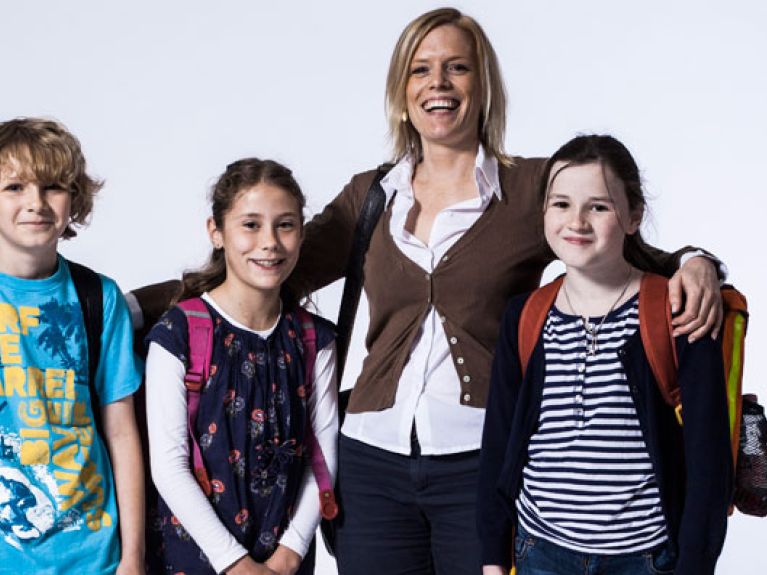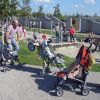Where Europe is everyday life
Committed Europeans: they put life into the idea of Europe and give new zest to the continent – each in their own way.

There’s no trace of the euro crisis. Shouts of joy and excitement echo throughout the corridors of the Textorschule in Frankfurt. Class 4d is off on a school trip next week, and 10-year-old Lina Koch is full of anticipation – they’re off to France! The children in her bilingual class have been learning French for four years because their school is a European School, one of 30 in the state of Hesse, and the central idea here is Europe. In addition to the bilingual classes and the contacts with France, the school also takes part in the Comenius Project, the educational exchange service in the European Union. “Our partner class comes from Cyprus,” say Lina and her classmates Sean Donohoe and Marie von Ilberg, and they tell you this so naturally, as if the Mediterranean island were one of Frankfurt’s local districts. The European bridge has long-since become part of normality for the children. The diversity is part of their everyday life, no matter whether they’re giving presentations about their neighbouring countries in the European Football Championship or sending their cardboard school mascot Theo Textor in an envelope around the world. When the girls and boys talk about Europe, it doesn’t sound artificial at all. There’s an atmosphere of lively curiosity about it. And the credit goes to the dedicated staff, such as principal Marina van der Linden and 30-year-old teacher Jana Eckert. When she talks about her experiences in Europe, she goes into raptures. “The time I have spent in other countries has made me far more open-minded,” she says, and now she wants to pass on her experiences: “It’s important to experience what Europe stands for, rather than just learning about it in theory.” And the principal of the school agrees with her completely. Her lively school cultivates an atmosphere of mutual respect and esteem, and Marina van der Linden wants to convey this beyond the school itself.
The European dream
It’s just a stone’s throw from the 100-year-old sandstone building of the Textorschule to the modern campus of the Frankfurt School of Finance & Management (FS). This is where tomorrow’s banking elite is being trained and where Professor Christoph Schalast teaches. Among other things, the 51-year-old professor lectures in European law. He has been teaching the foundations of Europe for ten years, in a 30-hour course. For instance, about how the European system of government works – the Commission, the European Council, legislative processes. “I could teach a lot more of course, because we often don’t have time for discussions,” says Schalast and gazes towards the River Main and the area of Frankfurt where the new premises of the European Central Bank (ECB) are already rising up high into the sky. There’s a banner on one of the building containers bearing the inscription “Seele” (Soul). Schalast feels a special bond with the soul, the key concept, the core of Europe. And when he talks about Europe it quickly becomes clear that he’s not simply a run-of-the-mill law expert. As a student, the native of Frankfurt was actively involved in the Action Reconciliation Service for Peace, working for the preservation of the concentration camp memorials at Auschwitz and Majdanek. His father, who was born in 1927 in Upper Silesia, passed on two important messages to him: say never again to war; and reconciliation with Poland must succeed. Perhaps it is this family heritage that fires Schalast’s intense enthusiasm for Europe: “We’ve forgotten what incredible progress Europe has made since 1945.” But because there’s no point in lamenting, the law expert is involved in discussions not only with students but also on modern communication platforms. He presented his plea “Create a new Europe” in the Internet forum TEDx. “I’d expected criticism, but it actually convinced the audience,” he says happily. So he carries on working to help young people to discover more about Europe and to revive the European dream.
Travelling around Europe
Franziska Maier is already dreaming this dream at the age of 21, and she is making her hands-on contribution by working in the office of a German Member of the European Parliament, Sabine Verheyen (CDU). She is gaining a semester of practical experience in Brussels as a student of politics and administration at the University of Friedrichshafen on Lake Constance. She also travels the continent for the European Youth Parliament (EYP). Franziska Maier is chair of the German EYP Association in Berlin and is always busy preparing the next meetings. The EYP is present in 36 countries and the associations exchange their members so they can debate, with resolutions and votes on decisions, just like in the real European Parliament. Her enthusiasm for Europe has been growing ever since she joined the EYP through a competition. And she is constantly motivated by the fact that she meets lots of nice people, not just when debating but also when dancing and having fun together – and when travelling around Europe.
Travelling around Europe is also one of 48-year-old Klaus Rennings’ personal experiences that he’s been enjoying since his youth. He visits a different European city almost every week, focusing on the environment and innovation. These are the researcher’s speciality at the Centre for European Economic Research. The thoughtful economist with the blue-rimmed glasses isn’t an eco activist. As deputy head of department he investigates such things as why companies develop environmentally friendly innovations and what effects this has on economic performance. He actually coined the term “environmental innovation” ten years ago in his publication “Redefining innovation”. He has just completed a final report for the European Commission concerning the impact of environmental innovation on competitiveness. He can’t reveal any results at the moment, but he basically sees Europe as a pioneer in climate policy and high environmental standards. In his vision of Europe in the year 2030 he expects the continent to still be a source of “greentech” guidance.
The young generation of Europeans
The European online magazine Café Babel is already very popular with young people, between say 18 and 35. It was founded a good ten years ago by French Erasmus students. Nowadays, cafebabel.com has evolved into a six-language Internet platform that reaches around 400,000 users throughout Europe each month. This is where young authors write about everything that inspires them, from the Dumpling King of Prague to the Occupy movement. Meanwhile, there are some 1,500 voluntary contributors (journalists, scientists, translators) from 27 European countries working regularly for the magazine. Christiane Lötsch is one of them. “Café Babel stands for a young generation of Europeans who have no other appropriate medium. In German newspapers we read the German view of things, but where can you find a topic viewed from a variety of perspectives?” says the 31-year-old. She’s just waiting for her editorial colleagues to arrive at the bar at HAU2, the Hebbel Theatre am Halleschen Ufer in Berlin-Kreuzberg.
After all, they don’t want to talk about their current topics in dreary conference rooms. They prefer to meet in Berlin’s cafés or bars. “The Berlin Blog is our key piece,” says Christiane Lötsch who was born in East Berlin. The online magazine, which is coordinated by employed staff at the editorial office in Paris, has blogs from 34 European cities. Christiane Lötsch started contributing to Café Babel four years ago. What began as a workshop has now become part of her life. “We make a good team.” she says. And her colleague, the blogger Sébastien Vannier, adds emphatically: “In Café Babel Europe isn’t seen from Brussels or Strasbourg – it’s seen from our everyday perspective.”

